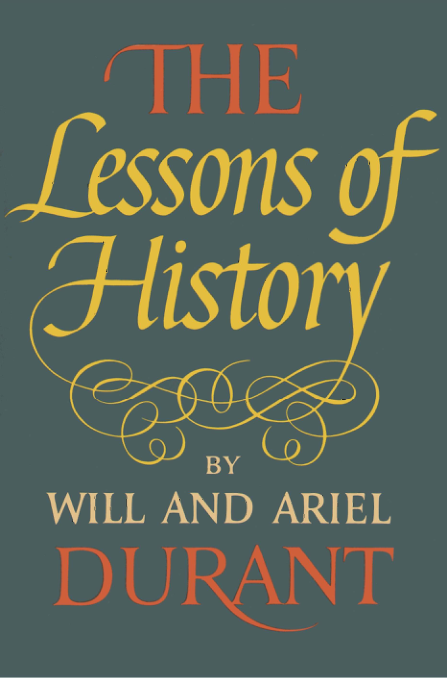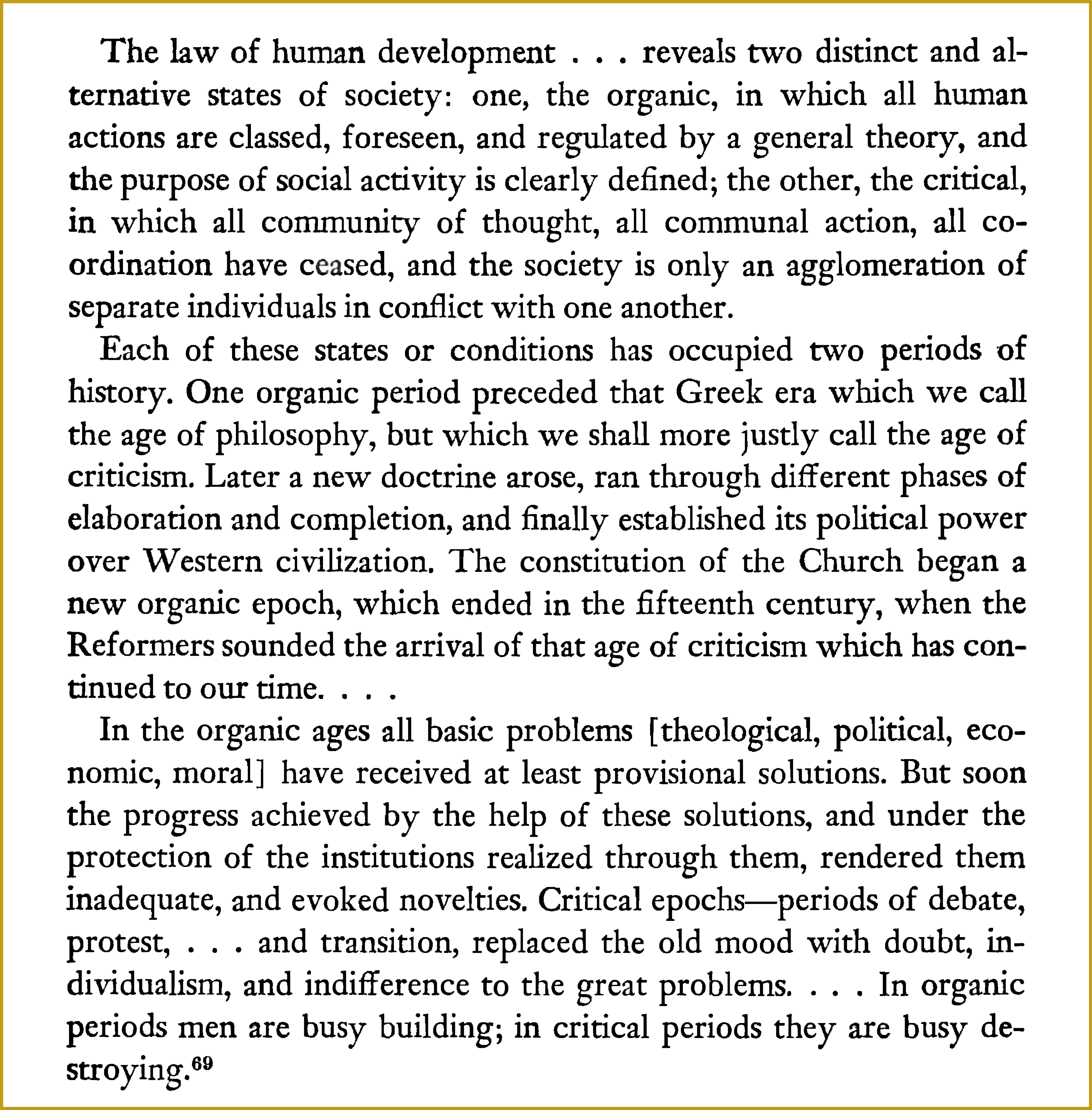Will_and_Ariel_Durant_-_The_Lessons_of_History - readwise.io

## Metadata
- Author: **readwise.io**
- Full Title: Will_and_Ariel_Durant_-_The_Lessons_of_History
- Category: #articles
- URL: https://readwise.io/reader/document_raw_content/45858663
## Highlights
- The development of the airplane will again alter the map of civilization. Trade routes will follow less and less the rivers and seas; men and goods will be flown more and more directly to their goal. Countries like England and France will lose the commercial advantage of abundant coast lines conveniently indented; countries like Russia, China, and Brazil, which were hampered by the excess of their land mass over their coasts, will cancel part of that handicap by-taking to the air. Coastal cities will derive less of their wealth from the clumsy business of transferring goods from ship to train or from train to ship. ([View Highlight](https://read.readwise.io/read/01hntx70zbw8t9d49jhv8bphsf))
- The influence of geographic factors diminishes as technology grows. ([View Highlight](https://read.readwise.io/read/01hntx7zsqd9ed31dcca3cf743))
- Therefore the laws of biology are the fundamental lessons of history. Weare subject to the processes and trials of evolution, to the struggle for existence and the survival of the fittest to survive ([View Highlight](https://read.readwise.io/read/01hntxf48kaz3s51qeb4950xrd))
- Utopias of equality are biologically doomed, and the best that the amiable philosopher can hope for is an approximate equality of legal justice and educational opportunity. A society in which all potential abilities are allowed to develop and function will have a survival advantage in the competition of groups ([View Highlight](https://read.readwise.io/read/01hntxvtcpqdt6y0q7xmxm7800))
- If the human brood is too numerous for the food supply, Nature
has three agents for restoring the balance: famine, pestilence, and war. In a famous Essay on Population (1798) Thomas Malthus explained that without these periodic checks the birth rate would so far exceed the death rate that the multiplication of mouths would nullify any increase in the production of food. Though he was a clergyman and a man of good will, Malthus pointed out that the issuance of relief funds or supplies to the poor encouraged them to marry early and breed improvidently, making the problem worse. ([View Highlight](https://read.readwise.io/read/01hnwsk889h493yg27zr6seds1))
- Biologically, physical vitality may be, at birth, of greater value than intellectual pedigree; Nietzsche thought that the best blood in Germany was in peasant veins; philosophers are not the fittest material from which to breed the race ([View Highlight](https://read.readwise.io/read/01hnyzvwxgsqwxvwwk2g9h3wg2))
- "Racial" antipathies have some roots in ethnic origin, but they are
also generated, perhaps predominantly, by differences of acquired culture-of language, dress, habits, morals, or religion. There is no cure for such antipathies except a broadened education. A knowledge of history may teach us that civilization is a co-operative product, that nearly all peoples have contributed to it; it is our common heritage and debt; and the civilized soul will reveal itself in treating every man or woman, hmvever lowly, as a representative of one of these creative and contributory groups. ([View Highlight](https://read.readwise.io/read/01hp00g98xapyaswae31zbexvy))
- Morals are the rules by which a society exhorts (as laws are the rules by which it seeks to compel) its members and associations to behavior consistent with its order, security, and growth. ([View Highlight](https://read.readwise.io/read/01hp2g97gks8zet8x6ex88mwnb))
- Moral codes differ because they adjust themselves to historical and environmental conditions. If we divide economic history into three stages-hunting, agriculture, industry-we may expect that the moral code of one stage will be changed in the next. In the hunting stage a man had to be ready to chase and fight and kill. ([View Highlight](https://read.readwise.io/read/01hp2gn47dv2hz9h1q0pq1gpk8))
- Presumably the death rate in men-so often risking their lives in the hunt-was higher than in women; some men had to take several women, and every man was expected to help women to frequent pregnancy. Pugnacity, brutality, greed, and sexual readiness were advantages in the struggle for existence. Probably every vice was once a virtue-i.e., a quality making for the survival of the individual, the family, or the group. Man's sins may be the relics of his rise rather than the stigmata of his fall. ([View Highlight](https://read.readwise.io/read/01hp2gqrm3cw8d4bspwjzwk2fp))
- Gradually, then rapidly and ever more widely, the Industrial Revolution changed the economic form and moral superstructure of European and American life. Men, women, and children left home and family, authority and unity, to work as individuals, individually paid, in factories built to house not men but machines. Every decade the machines multiplied and became more complex; economic maturity (the capacity to support a family) came later; children no longer were economic assets; marriage was delayed; premarital continence became more difficult to maintain. The city offered every discouragement to marriage, but it provided every stimulus and facility for sex. Women were "emancipated"-i.e., industrialized; and contraceptives enabled them to separate intercourse from pregnancy. The authority of father and mother lost its economic base through the growing individualism of industry. The rebellious youth was no longer constrained by the surveillance of the village; he could hide his sins in the protective anonymity of the city crowd. The progress of science raised the authority of the test tube over that of the crosier; the mechanization of economic production suggested mechanistic materialistic philosophies; education spread religious doubts; morality lost more and more of its supernatural supports. The old agricultural moral code began to die ([View Highlight](https://read.readwise.io/read/01hp2h3e68mf3wd5b7shdxkva6))
- Only a few Communist states have not merely dissociated themselves from religion but have repudiated its aid; and perhaps the apparent and provisional success of this experiment in Russia owes much to the temporary acceptance of Communism as the religion (or, as skeptics would say, the opium) of the people, replacing the church as the vendor of comfort and hope. If the socialist regime should fail in its efforts to destroy relative poverty among the masses, this new religion may lose its fervor and efficacy, and the state may wink at the restoration of supernatural beliefs as an aid in quieting discontent. "As long as there is poverty there will be gods. ([View Highlight](https://read.readwise.io/read/01hp2jtkggrkw5gb7245teqpb5))
- History, according to Karl Marx, is economics in action-the contest, among individuals, groups, classes, and states, for food, fuel, materials, and economic power. ([View Highlight](https://read.readwise.io/read/01hp2kc63zcd1nrp7bc7m30aj4))
- At the other end of the scale history reports that "the men who
can manage men manage the men who can manage only things, and the men who can manage money manage all." 34
So the bankers,
watching the trends in agriculture, industry, and trade, inviting and directing the flow of capital, putting our money doubly and trebly to work, controlling loans and interest and enterprise, running great risks to make great gains, rise to the top of the economic pyramid. From the Medici of Florence and the Fuggers of Augsburg to the Rothschilds of Paris and London and the Morgans of New York, bankers have sat in the councils of governments, financing wars and popes, and occasionally sparking a revolution. Perhaps it is one secret of their power that, having studied the fluctuations of prices, they know that history is inflationary, and that money is the last thing a \vise man will hoard. ([View Highlight](https://read.readwise.io/read/01hp54nxxqrzyyfp3te3ab2b9e))
- Since practical ability differs from person to person, the majority
of such abilities, in nearly all societies, is gathered in a minority of men. The concentration of wealth is a natural result of this concentration of ability, and regularly recurs in history. The rate of concentration varies (other factors being equal) with the economic freedom permitted by morals and the laws. Despotism may for a time retard the concentration; democracy, allowing the most liberty, accelerates it. The relative equality of Americans before 1776 has been overwhelmed by a thousand forms of physical, mental, and economic differentiation, so that the gap between the wealthiest and the poorest is now greater than at any time since Imperial plutocratic Rome. In progressive societies the concentration may reach a point where the strength of number in the many poor rivals the strength of ability in the few rich; then the unstable equilibrium generates a critical situation, which history has diversely met by legislation redistributing wealth or by revolution distributing poverty. ([View Highlight](https://read.readwise.io/read/01hp54wc4dt5x5hmnxamener8b))
- Marx was an unfaithful disciple of Hegel: he interpreted the Hegelian dialectic as implying that the struggle between capitalism and socialism would end in the complete victory of socialism; but if the Hegelian formula of thesis, antithesis, and synthesis is applied to the Industrial Revolution as thesis, and to capitalism versus socialism as antithesis, the third condition would be a synthesis of capitalism and socialism; and to this reconciliation the Western world visibly moves. ([View Highlight](https://read.readwise.io/read/01hp7md3y383pca1sdk12w57e4))
- Since wealth is an order and procedure of production and exchange rather than an accumulation of (mostly perishable) goods, and is a trust (the "credit system") in men and institutions rather than in the intrinsic value of paper money or checks, violent revolutions do not so much redistribute wealth as destroy it. There may be a redivision of the land, but the natural inequality of men soon re-creates an inequality of possessions and privileges, and raises to power a new minority with essentially the same instincts as in the old. The only real revolution is in the enlightenment of the mind and the improvement of character, the only real emancipation is individual, and the only real revolutionists are philosophers and saints. ([View Highlight](https://read.readwise.io/read/01hp97mmqzzqgdfgksdgpa2e19))
- Perhaps we are now restlessly moving toward that higher plateau of competition; we may make contact with ambitious species on other planets or stars; soon thereafter there will be interplanetary war. Then, and only then, will we of this earth be one. ([View Highlight](https://read.readwise.io/read/01hpabdd6t0jwf9sec8nzv0jby))
- We have defined civilization as "social order promoting cultural creation." ([View Highlight](https://read.readwise.io/read/01hpabegdv0bbak8d5h7nrft4s))
-  ([View Highlight](https://read.readwise.io/read/01hpabrd7wt1rcd40eegp2289p))
- Civilizations are the generations of the racial soul. As life overrides
death with reproduction, so an aging culture hands its patrimony down to its heirs across the years and the seas. Even as these lines are being written, commerce and print, wires and waves and invisible Mercuries of the air are binding nations and civilizations together, preserving for all what each has given to the heritage of mankind. ([View Highlight](https://read.readwise.io/read/01hpabvac8zphsjj6nd33p6etn))
- The historian will not mourn because he can see no meaning in human existence except that which man puts into it; let it be our pride that we ourselves may put meaning into our lives, and sometimes a significance that transcends death. If a man is fortunate he will, before he dies, gather up as much as he can of his civilized heritage and transmit it to his children. And to his final breath he will be grateful for this inexhaustible legacy, knowing that it is our nourishing mother and our lasting life. ([View Highlight](https://read.readwise.io/read/01hpj2ydsnkg0vdem7g5qhj87j))